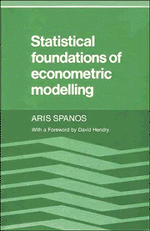Preface
Published online by Cambridge University Press: 01 June 2011
Summary
This book has grown out of lectures given in M.Sc. and third-year undergraduate courses at Birkbeck College and the University of Cambridge by the author since 1980. It is designed as a text for advanced undergraduate and graduate level courses in econometric theory and as a reference book for research workers in applied econometrics.
Since the early 1970s a growing number of applied econometricians began to realise that the ‘textbook’ methodology for econometric modelling was much too rigid and narrow to be directly applicable in practice. The scope of econometric modelling was viewed by the ‘textbook’ methodology as the quantification of theoretical relationships. As a result, textbooks and courses in econometric theory tended to concentrate almost exclusively on the problem of estimation, with passing references to diagnostic testing (testing the assumptions on whose validity the estimation results depend). Econometrics textbooks encouraged the ‘myth’ that the main ingredients for constructing good empirical econometric models were a ‘good’ theoretical model and a menu of estimators (OLS, GLS, 2SLS, LIML, IV, 3SLS, FIML). Armed with these you turn the theoretical model into a statistical model by attaching a white-noise error term and after you help yourself to some observed data series your only problem is one of choosing the best estimator from the available menu. In practice, however, the reality of econometric modelling turned out to be very different, posing numerous problems for which the ‘textbook’ methodology offered no real solutions.
Information
- Type
- Chapter
- Information
- Statistical Foundations of Econometric Modelling , pp. xv - xixPublisher: Cambridge University PressPrint publication year: 1986
